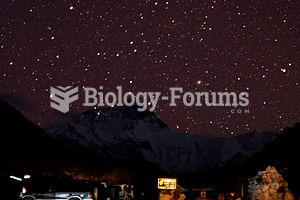|
|
|
There can actually be a 25-hour time difference between certain locations in the world. The International Date Line passes between the islands of Samoa and American Samoa. It is not a straight line, but "zig-zags" around various island chains. Therefore, Samoa and nearby islands have one date, while American Samoa and nearby islands are one day behind. Daylight saving time is used in some islands, but not in others—further shifting the hours out of sync with natural time.
After 5 years of being diagnosed with rheumatoid arthritis, one every three patients will no longer be able to work.
In most cases, kidneys can recover from almost complete loss of function, such as in acute kidney (renal) failure.
Green tea is able to stop the scent of garlic or onion from causing bad breath.
Today, nearly 8 out of 10 pregnant women living with HIV (about 1.1 million), receive antiretrovirals.







